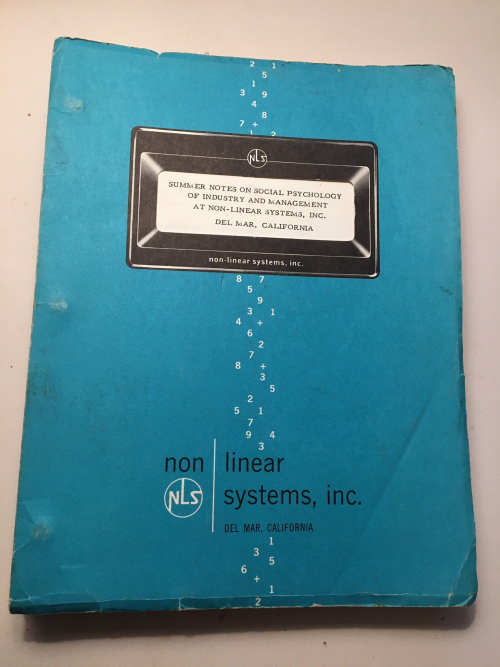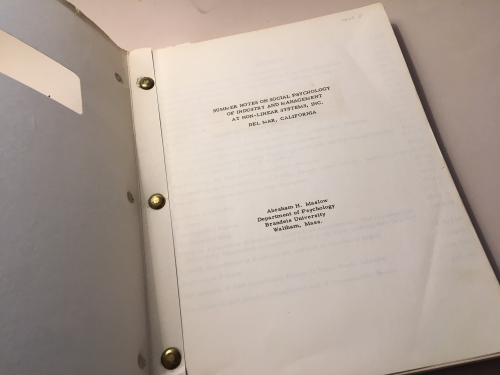 MASLOW, Abraham. Summer Notes on Social Psychology of Industry and Management at Non-Linear Systems, Inc, Del Mar, California. Published by Non-Linear Systems, 1962. 11.5x8" 148 leaves. (This is misleading: the pages are single spaced and have 50+ lines/page with 15+words/line, making this document about 100,000 words, or more along the lines of a 250pp book.) 1500.00
MASLOW, Abraham. Summer Notes on Social Psychology of Industry and Management at Non-Linear Systems, Inc, Del Mar, California. Published by Non-Linear Systems, 1962. 11.5x8" 148 leaves. (This is misleading: the pages are single spaced and have 50+ lines/page with 15+words/line, making this document about 100,000 words, or more along the lines of a 250pp book.) 1500.00
Three-ring holed held together with brass holders, with thickish NLS wrappers. Very good copy.
WorldCat/OCLC identifies 12 locations for the work--however, I cannot identify a paper copy, as they all may be electronic copies. For example, St. Andrews, San Diego, and McGill (my school) identify their copies explicitly as e-books; and then the obvious ones are Google, Hathi Trust, and UC Mass Digitalization. Then there are three (like U New Mexico) where when you go to the school's records the OCLC number is "not found" or "your OCLC number would be here" but isn't. The remaining three are inconclusive. Obviously someone has an original somewhere, but I'm not sure where that is. The OCLC 12 is therefore misleading. At best there are three cases where maybe-but-probably-not the libraries have a paper copy. I'd say conservatively that the OCLC number is three, but it may actually be one.
This is an interesting document by a major psychology name poking around in a new field. I reproduce the author's statement in (nearly) full because it tell exactly what Maslow was doing.
"I had never before had any contact with industrial or managerial psychology, so the possibilities for psychological theory hit me with great force as I read first the books by Drucker and McGregor that are used as "textbooks" at Non-Linear, and as I began to understand what Andrew Kay was trying to do there.I started dictating my impressions to the tape recorder. They are mimeographed here without editing, addition, subtraction, or other change, beyond correction of typographical and grammatical errors, to be passed out to my friends for discussion, because I don't know if they will ever be published more formally."
"I have been told by enough people that they are interesting and useful to make me
agree to this informal kind of communication. They should be understood as first impressions, unformed, not further worked up, of a theoretical psychologist taking his first look at a new (for him) field of knowledge and realizing that it was of great import for various of his theoretical concerns (and vice versa). I have learned in other contexts that the novice can often see things that the expert overlooks through long familiarization."
And the table of contents:
Notes on Unstructured Groups at Lake Arrowhead 1-20
The Theory of Social Improvement; The Theory of the Slow Revolution 20-28
Experiments on Low Grumbles, High Grumbles, and Meta Grumbles 28-34
Notes on the B-Values 34-35
Notes on Self-Esteem in the Work Situation 35-40
Memo on Existential Psychology 40-44
Notes on Creativeness 44-47

Notes on Synergy 48-58
Eupsychian Management as a Psychological Experiment 59-63
Enlightened Management as a Form of Patriotism 63-66
Memorandum on Syndrome Dynamics and Holistic, Organismic Thinking 67-73
Memorandum on Transition to Eupsychian Management 73-76
Notes on the Relationship between Psychological Health and the Characteristics 76-80;
of Superior Managers (Notes from Likert) 114-117
The Necessity for Enlightened Management Policies --80-81
Memorandum on the Redefinition of Profit, Taxes, Costs, Money, Economics, etc. 82-91
The Good Eupsychian Salesman and Customer 91-94;
Notes on Leadership 95-97
B-Power 97-101
The Superior Person 101-107
The Superior Boss 107-114
Notes on Eupsychian Economics, Eupsychian Management; The Assumptions 118-128
Underlying Eupsychian Management Policy; On First Looking Into Drucker
A Ninth Department in Business (In Addition to Drucker's Eight) 128-133
Regressive Forces 133-134
The Attitude of Self-Actualizing People to Duty, Work, Mission 134-141
The Goals of Enlightened Management and of Organization Theory 147-148





Comments